2018|Rising Filmmakers Project|Introducing film festivals
In this page, you can read talks before screenings by representatives of each film festival such as programming directors.
*comments given after talks are at the bottom of each page.
There are also reports of talk events after screenings by filmmakers and related guests, and interviews with filmmakers.
(Information on the event, films and filmmakers is here)
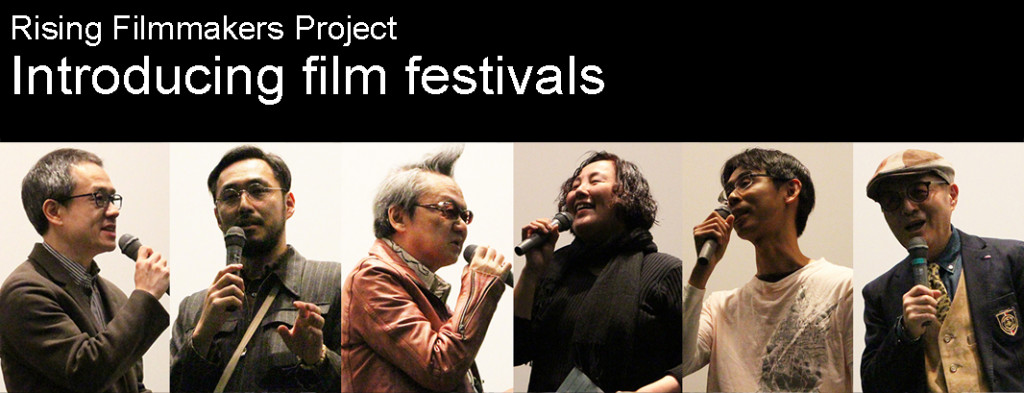
“Siblings of the Cape” Jan.26(sat)11:00-
SKIP CITY INTERNATIONAL D-Cinema FESTIVAL Programming director: Toshiyuki Hasegawa
“Dead Cop”, “ICHIMONJI KEN Prologue Kung Fu Boy VS Murder Karate Man” Jan.26(sat)14:05-
Kanazawa Film Festival, Director: Ikuya Onodera
“ED OR (THE UNEXPECTED ERECTION OF YOU)” Jan.26(sat)17:15-
Yubari International Fantastic Film Festival Programming Director: Tokitoshi Shiota
”Orphans' Blues” Jan.27(sun)11:00-
Pia Film Festival Director: Keiko Araki
“CenterLine” Jan.27(sun)14:05-
Fukuoka Independent Film Festival Programming director: Daisuke Otsuka
“Chonticha at end of the summer” Jan.27(sun)16:50-
Tanabe-Benkei Film Festival Special Jury Chair: Yoshio Kakeo

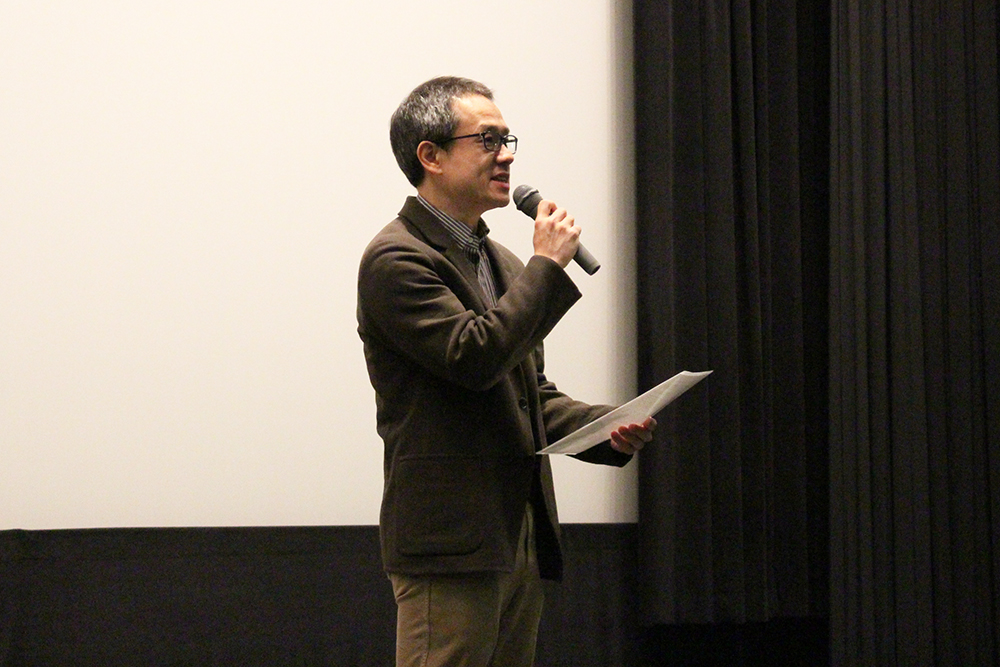
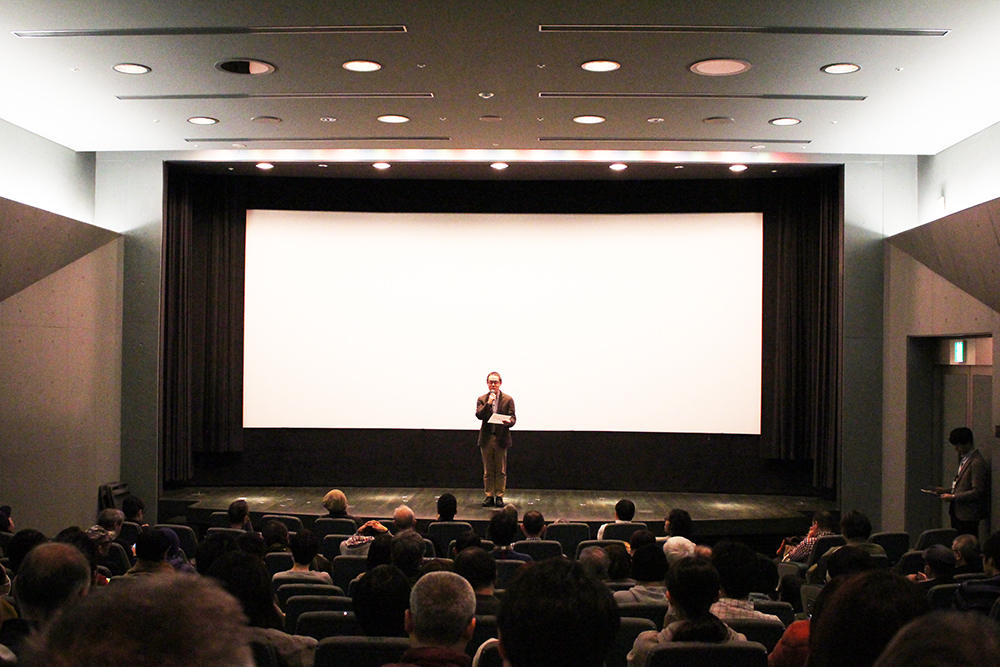
January 26, 2019 at B1 Theatre, National Film Archive of Japan
Good morning, everyone. My name is Toshiyuki Hasegawa and I am in charge of programming at the SKIP CITY INTERNATIONAL D-Cinema FESTIVAL. First, I’d like to introduce our festival to you. SKIP CITY INTERNATIONAL D-Cinema FESTIVAL takes place every July in the city of Kawaguchi in Saitama Prefecture. This year will be the 16th edition. SKIP CITY is a facility complex for audiovisual arts which opened in 2003 on a plot of land where an NHK transmission tower used to stand. It houses a filming studio, post production facilities with the capacity to edit 4K footage, a theater with a permanent 4K projector, the Visual Museum where visitors are offered a hands-on learning experience, Incubate Offices that provide young filmmakers with office space, and other facilities.
Our film festival takes place in SKIP CITY, presenting an International Competition and a Japanese Film Competition – both limited to feature-length films by directors who have no more than three directing feature credits. There is also a competition section for Japanese directors who have yet to make a theatrically-released feature. Today’s talk event guest is filmmaker Kazuya Shiraishi, who has been churning out masterpieces such as “The Blood of Wolves” (2018) released last year, “Dare to Stop Us” (2018), and “Birds Without Names” (2017). Our festival introduced his directorial debut feature “Lost Paradise in Tokyo” in 2009.
Director Ryota Nakano – renowned for his first commercial feature “Her Love Boils Bathwater” (2016) and whose just-announced film “A Long Goodbye” is slated for a May release this year – his first independent feature “Capturing Dad” was presented in our competition in 2012. Further, we played two shorts by Shinichiro Ueda in our competition programs (“Dreaming Novelist” (2011) in 2012 and “Take 8” (2015) in 2016) even before his phenomenal hit last year “One Cut of the Dead” (2017) raised an uproar in the Japanese film industry. Incidentally, Shinichiro Ueda is a tenant in one of SKIP CITY’s Incubate Offices.
Our film festival offers cash prizes to winners of each category. Of the titles I mentioned already, “Lost Paradise in Tokyo” and “Capturing Dad” have won the SKIP CITY AWARD, given to outstanding Japanese films. The award offers free production services. Also, our festival supports the film's theatrical release and introduce the films to film festivals overseas.
The film you are about to see is “Siblings of the Cape”. A handicapped man who finds himself without a job starts to prostitute his younger sister who is mentally disabled. It’s a shocking story, but there’s humor and we see a love between the siblings, the striking beauty of images shot throughout the four seasons, and the excellent performance of lead actors Yuya Matsuura and Misa Wada. At last year’s festival, the film won not only Best Picture (Japanese Feature category) but also the Audience Award.
As I mentioned earlier, our festival aims to connect filmmakers to opportunities overseas. Today’s film has been invited to the 42nd edition of Göteborg Film Festival in Sweden, which just began yesterday. It will compete alongside seven other directorial debut films in the Ingmar Bergman Competition, an international competition program named after the master filmmaker. Director Katayama is scheduled to travel to Sweden next week. His film will be theatrically released in Japan on March 1 under the support program “Saisoku saitan zenkoku gekijo kokai project” (Fastest Short-cut to Nationwide Cinema Release Project), in which distributor Presidio Corporation handles the big screen releases at Aeon Cinema Itabashi, Human Trust Cinema Yurakucho, and other cinemas. If you enjoy the film today, please do talk about it on social media and recommend it to your friends and family.
I’ll end this talk with a promo. Submissions to our July festival are now open. The deadline is March 1. We look forward to entries by talented filmmakers following in the ranks of directors Kazuya Shiraishi, Ryota Nakano, Shinichiro Ueda, and Shinzo Katayama of today’s film “Siblings of the Cape”. I hope you do enjoy this debut feature by Shinzo Katayama. The film is 89 minutes long.
【SKIP CITY INTERNATIONAL D-Cinema FESTIVAL|Official Website】http://www.skipcity-dcf.jp/en/index.html
・The Birth of “Saisoku saitan zenkoku gekijo kokai project (Fastest Short-cut to Nationwide Cinema Release Project)”
The festivals of 2010 to 2013 organized the SKIP CITY D-Cinema PROJECT, an initiative to support the cinema release of one Japanese feature film from the festival program per year. Since the project was originally a 3-year plan, it wrapped after four years. But as we kept trying to find ways for distribution support, we managed to invoke the participation of partner companies in 2018, our 15th anniversary, for a one-year project to bring a film to the distribution circuit. While film festival screenings alone can rarely reach the eyes of industry professionals, a theatrical distribution model will increase opportunities for businesses to acknowledge our films. With the success of Shinzo Katayama’s “Siblings of the Cape”, we hope to be able to continue support for cinematic release.
・Dividing the Competition Sections into Two Categories from 2018
We did this because we wanted to show more feature-length Japanese films. From 2009 to 2017, the current International Competition was called Feature Length Competition (International), which included three Japanese titles. Last year (2018), we were able to screen one in this category and four in the Japanese competition category – a total of five Japanese features. Although our intention is to keep pushing up the numbers, the problem is that the technical quality of Japanese films shades in comparison to non-Japanese films made on a much bigger budget. Juries in the past have often mentioned this issue. And so we decided not to pre-determine the number of Japanese titles in each category, but rather keep our selection flexible so that films of a quality and perspective on par with international titles could be included in the international competition, while those that will benefit from being in competition with other Japanese films could be put in the Japanese Film Competition. This way, more Japanese feature titles will be included in the program and each film will shine in its best slot.
・Establishing a Network with Film Festivals Abroad
This comes about case by case. Usually, we send films with potential to film festival programmers we already know. Sometimes we ask the coordinator at Kawakita Memorial Film Institute to help put our film on their list, and we also speak directly to festival programmers attending networking events organized by Tokyo International Film Festival (TIFF). The selection of “Siblings of the Cape” for Göteborg Film Festival’s Ingmar Bergman Competition came about through a TIFF networking event, and so we are very grateful to the TIFF team. In another instance, we negotiated the international sales deal for Ryota Nakano’s “Capturing Dad” (which we premiered in 2012) on behalf of the director and producer and signed with a Dutch sales company. This resulted in screenings at Berlin International Film Festival and many other festivals, thanks to the work of this Dutch company.
We are determined to continue our international networking efforts, and to keep pushing for opportunities to show our films overseas. For filmmakers who are not of the small handful of internationally acclaimed Japanese directors – even those who have yet to prove their worth in Japan, the international scene offers a leveled playing field. As in the case with “Capturing Dad”, we look forward to the possibility of international success boomeranging to renewed interest from domestic industry players.
・Message or Advice to Filmmakers Today and Tomorrow
Ask yourself what is special about your film, and what is your selling point. We (at the festival) will do our best to lean in to understand it.
Over the years, we have seen the growth of an audience who attends our festival out of pure love for cinema. Their reaction to your film is potentially an important indicator for the future of your filmmaking. I hope we will be receiving many entries.
Translator: Asako Fujioka

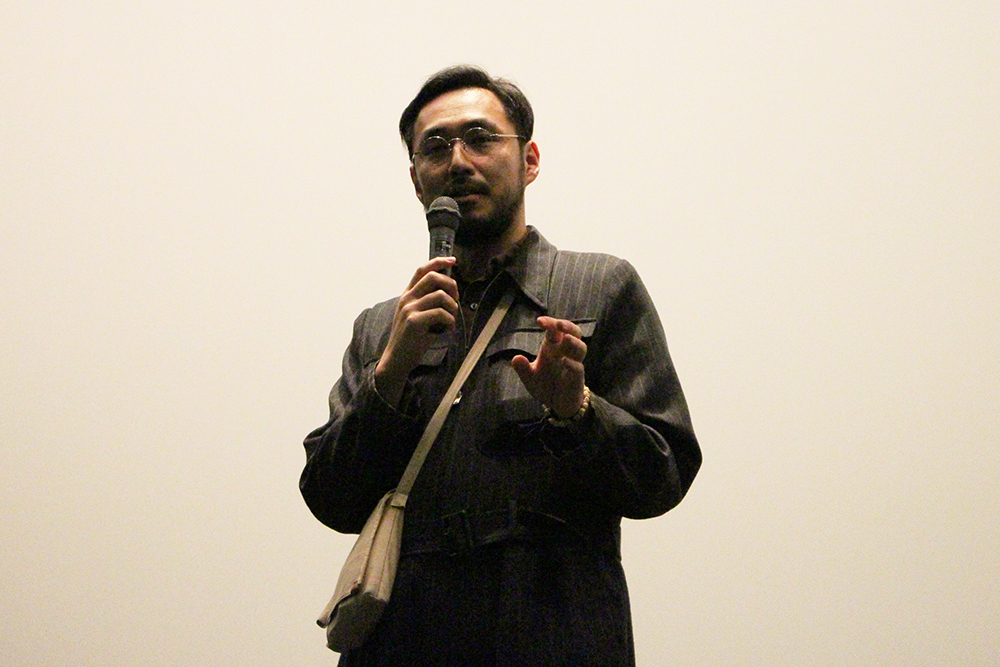
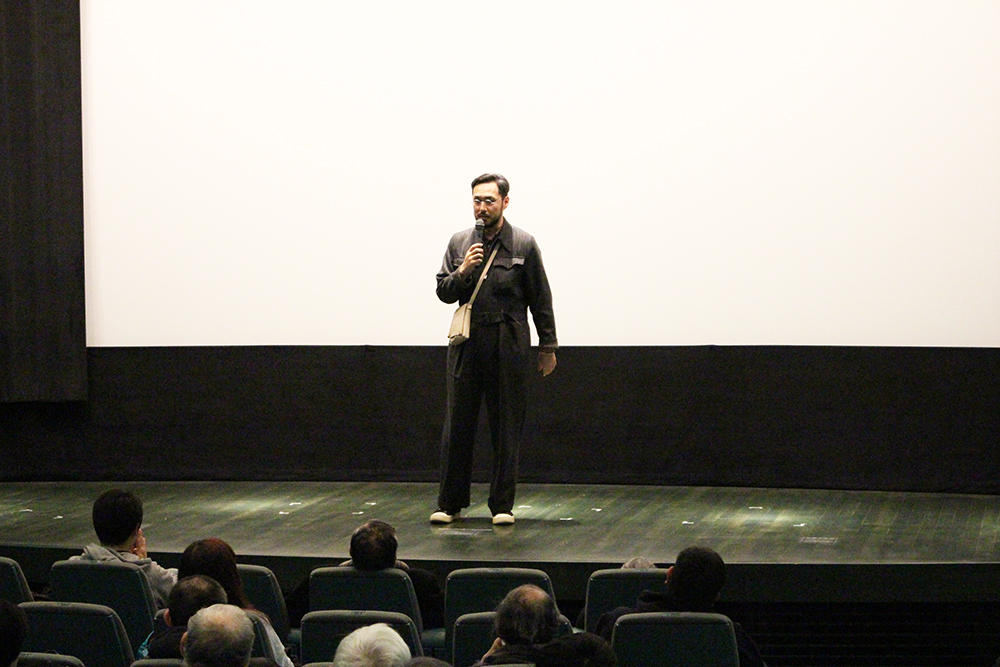
January 26, 2019
at B1 Theatre, National Film Archive of Japan
Hello. My name is Onodera and I host the Kanazawa Film Festival. We’ve been organizing Kanazawa Film Festival in Kanazawa City, Ishikawa Prefecture every year since 2007. This year will be the 13th edition. Until 2016, the festival took place in the former Roxy Theatre, a closed-down cinema in the basement of the Miyako Hotel in front of Kanazawa Station. But due to redevelopment, the hotel shut down its business in March 2017 and now there’s just an empty lot there. Since we were faced with losing the main venue, we initially announced the 2016 edition to be its last. But when festival guest Yuya Uchida insisted that we “Keep it going!” we decided to continue. But what would we do without an appropriate venue? Hollywood actor Crispin Glover was another of our guests that year, and he proposed that we “let the festival take place in different cities.” And so we adapted to this form. We don’t tour the same program, but select themes for each edition with the specifics of each location and theater space in mind.
In our home base Kanazawa, we feature independently produced films under the program title Expected New Film Directors. Today you will be seeing two films by the 2018 Grand Prix winner of the Expected New Film Director award Yu Nakamoto – “Dead Cop” and “ICHIMONJI KEN Prologue Kung Fu Boy VS Murder Karate Man”. Although these two films were submitted to the festival separately, we discovered that the two together comprise a neat 90-minute program with some overlap in content. As an entertaining package, it seemed like a nice fit, so we decided to show them as a pair.
The characteristic of Kanazawa Film Festival would be that well-made films are rarely winners of the Grand Prix. For example, 2014 Grand Prix winner “Night Safari” director Yuki Kobayashi moved on to make his commercial film debut “Death Row Family” (2017), while 2016 winner “Sainara, Bad Samurai” (Sayonara Bad Samurai) director Daisuke Ono made his commercial film debut with “Astral Abnormal Suzuki-san” (2018) that’s currently running in cinemas. Their first films were technically problematic, but were awarded for a certain uniqueness that stood out among all the films in the program – including Japanese, foreign, and commercial films.
This year again, we plan to present the Expected New Film Directors program in Kanazawa in July. We have an open call for entries until March 31. Anyone here who makes indie films or who knows people who do, please check out Kanazawa Film Festival online. Thank you.
【Kanazawa Film Festival|Official Website】https://www.eiganokai.com/ (in Japanese)
・Why Start a Competition for Young Directors?
We wanted to publicly recognize and introduce new directors from the Festival’s perspective.
・Message or Advice to Filmmakers Today and Tomorrow
I think filmmakers should be more aware of the importance of drawing an audience and showing the film to an audience when they choose their titles or decide on film length. Our film festival does not demand technical finesse or a balanced perspective, as long as the film has a powerful pull.
Translator: Asako Fujioka

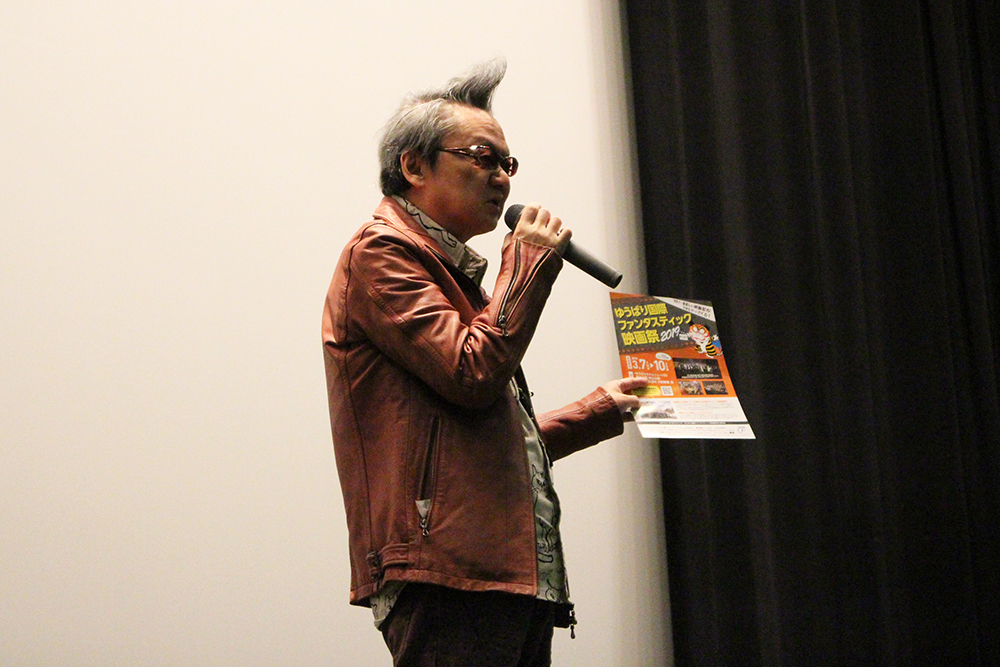
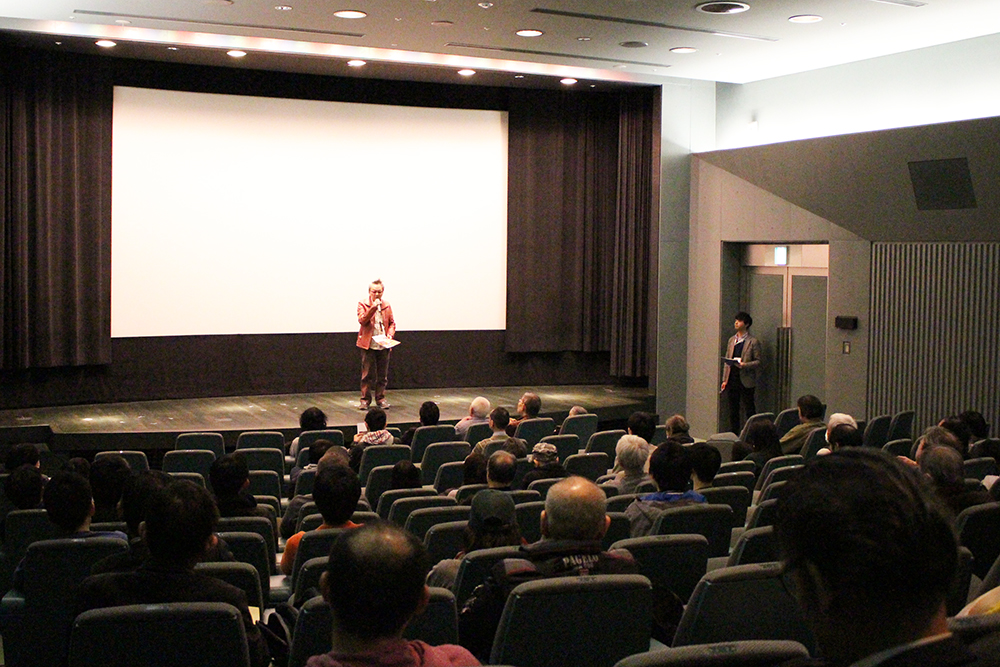
January 26, 2019
at B1 Theatre, National Film Archive of Japan
Thank you all for attending this session. I’m Shiota and I’m a film critic. “ED OR (THE UNEXPECTED ERECTION OF YOU)” – indeed, the title makes me wonder whether it’s proper to show this at the National Film Archive of Japan, but it’s actually a film and title very characteristic of Yubari International Fantastic Film Festival. Next year will be 30 years since the start of the festival and we have seen the Fantastic Off Theater Competition change a lot over the years, from the early days to today. I guess it settled down to what it is now around 1999, when Nobuhiro Yamashita’s “Hazy Life” won the Grand Prix. Today we have screenwriter Kosuke Mukai coming on stage for a talk event. I do believe Yubari was responsible for the making of Mr. Mukai as a screenwriter.
Among the six film festivals taking part in this “Rising Filmmakers Project”, we are the only festival with “fantastic” in the name. So we do have the fantastic film genre at our core, but it’s not just about masterpieces in sci-fi or horror. You could say anything goes. In fact, the film you will be seeing today is what some would call a typical youth film. As long as the film style is more fantastical than realistic, it’s passed the Yubari International Fantastic Film Festival requirements.
When we first started the festival, our goal was to pick up films that the Pia Film Festival would not. That resulted in a series of great filmmakers who go on to carry the weight of Japanese cinema – after Yamashita, we had Yu Irie, Keisuke Yoshida with “Come On Irene” (2018), and winner of two consecutive festivals Tetsuya Mariko.
This year’s festival will take place from March 7 to 10 in Yubari. It’s actually one day shorter than usual. The festival budget is shrinking. We usually ask guests to stay overnight on the last day and send them home in the morning, but shortening the festival was the bitter but best way we could cut back on costs. The number of films in competition is also less than before. We used to show nine or ten, but this year we could only choose six. We will announce the lineup at a press conference on Feb. 6, and you’ll see that we have a pretty amazing program including “Mimicry Freaks” and “Togenkyoteki musume (A Girl from Shangri-la)” which also showed at Kanazawa Film Fest.
Meanwhile, as you can see in our name which includes the word “international,” we are not only concerned about Japanese films. “Invasion of Alien Bikini” (2011) was a Korean film that won the Grand Prix in the past. We would like to be a place for cross-pollination of Japanese and international talent. Notwithstanding our lack of funds, we hope, with your support, we will be able to continue for the next 30 or 40 years. If you watch today’s film and think “Yubari International Fantastic Film Festival sounds like fun,” do make a trip to Yubari and give us your support. Thank you very much.
【Yubari International Fantastic Film Festival|Official Website】http://yubarifanta.com/ (in Japanese)
・Future Efforts for the Film Festival
We need to help establish an ecosystem where films can be shown to wider audiences after the festival. The best way is for each film to sign with a proper distributor. The ideal is for films to reach a wider audience through the regular route, as in the case of “One Cut of the Dead”.
・Message or Advice to Filmmakers Today and Tomorrow
It’s better to make films that you believe in, than being misled by others’ opinions. Having said that, I hope filmmakers remember that for their audiences, all films, however playful they may have been made, follow in the century-long history of cinema. I hope their films can stand the flow of history and not be just selfishly frivolous projects.
True to our festival name Yubari “International” Fantastic Film Festival, we include at least two jurors from overseas and show films not only in competition but also invite fantastic films that would be released to the general public. As we invite as many directors as possible, audiences get to meet directors of these invitation films in Yubari. I believe this can be a big opportunity for independent filmmakers. In the past, Quentin Tarantino has joined us, as well as Kim Ki Duk who suddenly attended on his own cost in 2016.
Translator: Asako Fujioka

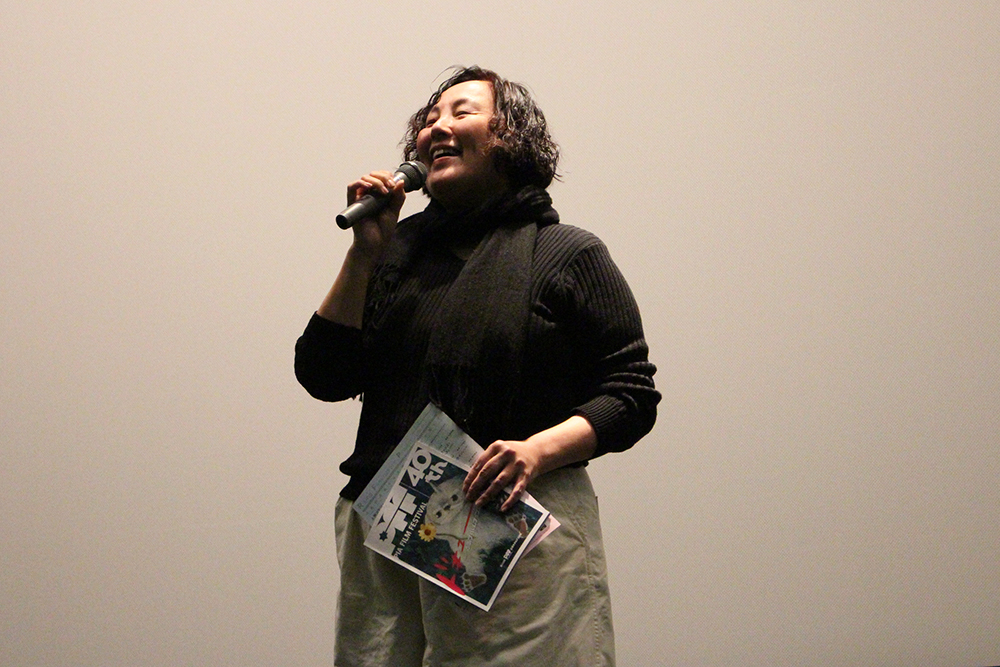
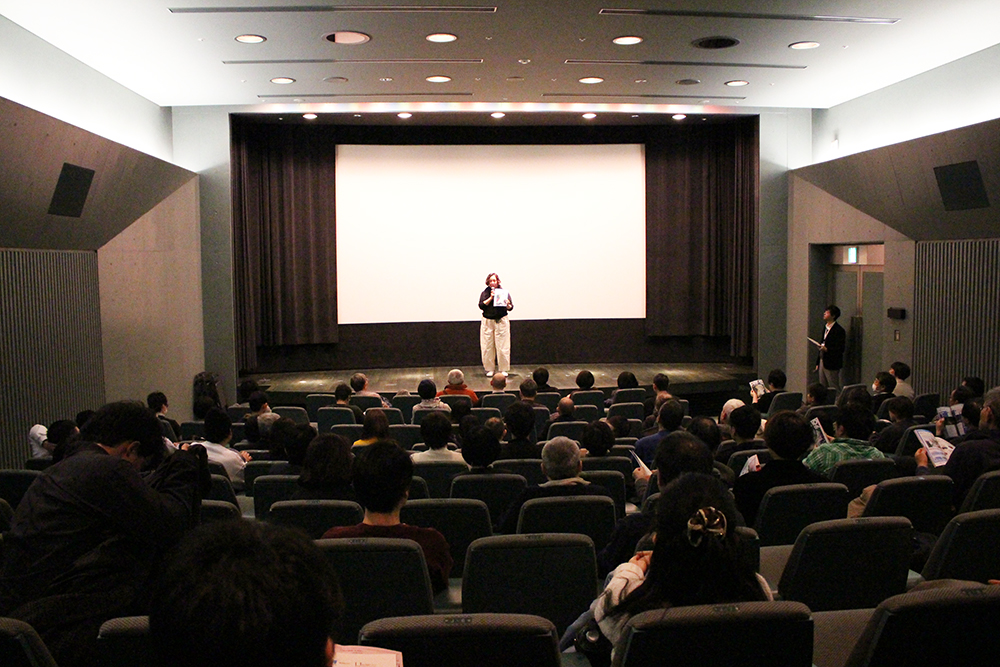
January 27, 2019
at B1 Theatre, National Film Archive of Japan
I’m Araki of Pia Film Festival. Please excuse my arrogance for speaking to you from this high stage. At the door today, you were handed copies of our pamphlet from this year’s 40th edition. In the hope that more people will get to know the films, we started handing them out for free last year. “Orphans’ Blues” was awarded Grand Prix out of 18 films in the PFF Award competition’s official selection. If you find some films that interest you in this pamphlet, do check for online streaming services.
Our film festival started in 1977 under two themes: “Finding and nurturing new filmmaking talents” and “Creating a new environment for film.” Over the years, we have continuously thought about and worked to connect makers of self-produced films to a world beyond. I consider these people those who are “so determined to become film directors, they are ready to clear their own paths open.”
The distinct feature of our competition is that there are no rules. There are no conditions in terms of the nationality, age, gender of the applicant, nor length or genre of the film. The only regulation is that the completion date of the film needs to be after the application deadline of the previous year’s festival. In other words, the film must have been completed within the past year. Some people send in older films by re-editing a new version.
Having no regulations makes it difficult not only for the filmmakers but also for the selection team. When we are confronted with experimental films, drama, animation, documentary, and all kinds of submissions, and must decide what is outstanding among them, the key lies in who is doing the choosing. Every year, we ask around 16 people to join the selection team to watch around 500 to 600 films. Every film must be watched from beginning to end, and each film will be seen by at least three people. If a film moves all three people and provokes a heated discussion in the selection meeting, it is passed to the other team members to watch. Sometimes a film cannot gain enough support to be sent to the entire team, but seems interesting enough that I decide to watch it. In any case, Pia Film Festival has continued in the spirit of combing through all the entries to make sure that “this inscrutable thing called talent should not be overlooked.”
Sometimes there are entrants who have carefully studied the trends and methods of “films that get acknowledged” and send us films that look like that. I have to say, this kind of effort is useless. Films that get chosen have something special within, something that closes in on you. It is something that the team can’t help but notice. My long experience says that filmmakers should totally disregard any thought of “aiming for what’s in trend” or “this film festival’s taste” and just make the film they want to make. When you decide to make a film, you have a goal. Often you will start from copying the director you admire. But when you copy, why not copy to the hilt, so that your film goes beyond the original. Or, you might choose not to copy at all, and investigate what you and only you can do. In any case, I believe that kind of intensity will naturally show its face.
Likewise, our past 40 editions have been held in the desire to be a film festival that does what no others can. What is needed in the next stage? How can we carry on encouraging filmmakers to “keep making films” when the film industry is in a struggling state? We continue with our festival with a strong concern for what it is we can do. I applaud the current increase of film festivals today, because there are fewer and fewer opportunities to show films on the big screen. Film festivals are responsible for the very important mission of showing self-produced films on the cinema screen.
They say that in the commercial film world, only filmmakers who can reach box office returns of three billion yen will be considered outstanding directors. Self-produced films are not intended to cash in three billion yen, but they do have the potential to become a very special film for someone. I believe it is the film festival, instead of the cinema, that should carry the task of making this happen. I hope that through film festivals around the country, more and more people will experience watching a film on the big screen with a large audience. Filmmakers often see their own films on the big screen for the first time at festivals, and I encourage them to do so. The historical origin of cinema is rooted in the communal experience.
Why “Orphans’ Blues” won the Grand Prix? That, I can’t say (laughs). The director Ms. Kudo, who is here today, probably did not imagine that her film would win the Grand Prix. The shortlisted 18 films were all so different. But I would say that in “Orphans’ Blues” there was an inherent power that closes in on the viewer, an unforgettable strength, that was just a little stronger than the others. At Pia Film Festival, we believe in the unreserved voices of the pre-selection committee and jury members who push for a film. Our policy is to support all-out discussion and never decide by counting votes. So it’s certain that there was someone on the jury who pushed strongly for “Orphans’ Blues” with a mighty voice.
With this screening, which will start shortly, you will soon see what I mean by a power that closes in on you. There is an incredible number of filmmakers with fabulous potential being born all the time. We are not looking for immediate results. If there are industry associates in the audience today, I’d like to ask you to take time in nurturing talent, and allow us to see blossoms bloom three or five years from now. Thank you.
【Pia Film Festival|Official Website】https://pff.jp/en/
・What are the Shifting Trends of Entries Over Your Career as Director Since 1992?
There used to be a general cut-off age when filmmakers “quit doing self-produced films.” Nowadays, it is not rare for people to continue making films even after entering the work force.
・Message or Advice to Filmmakers Today and Tomorrow
PFF deals with self-produced films. I always wish for filmmakers to surge on without fear and to indulge in the joys and foreboding of filmmaking of this kind that have no restrictions, no deadlines, and that are totally free. On the other hand, it’s true that Japanese self-produced films are notorious in the world for their low sound quality. I would recommend filmmakers to pursue the sound issue in order to raise their films to a higher stage.
Translator: Asako Fujioka

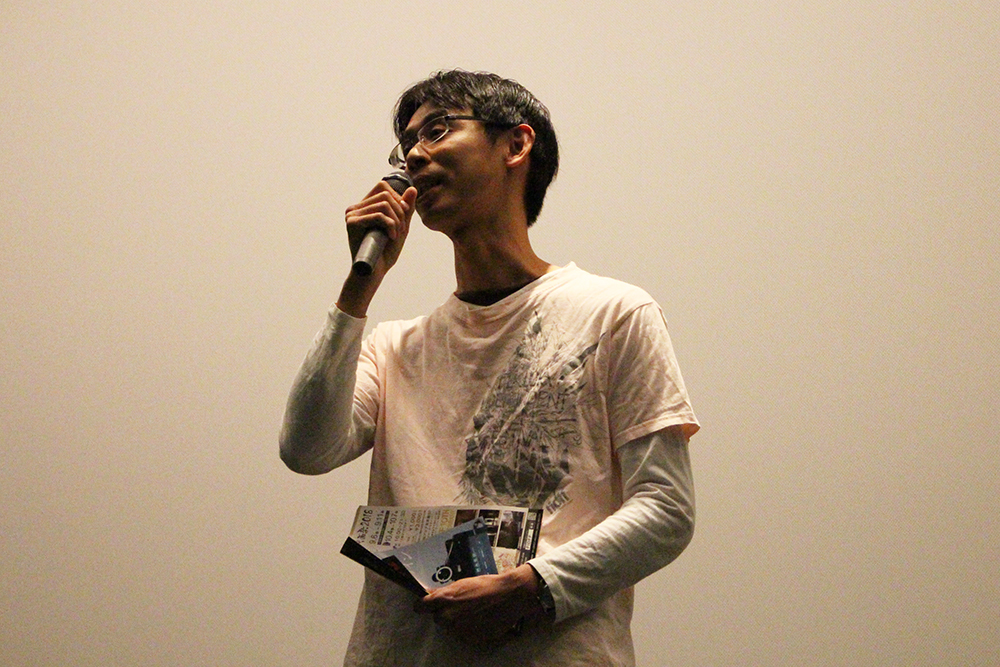
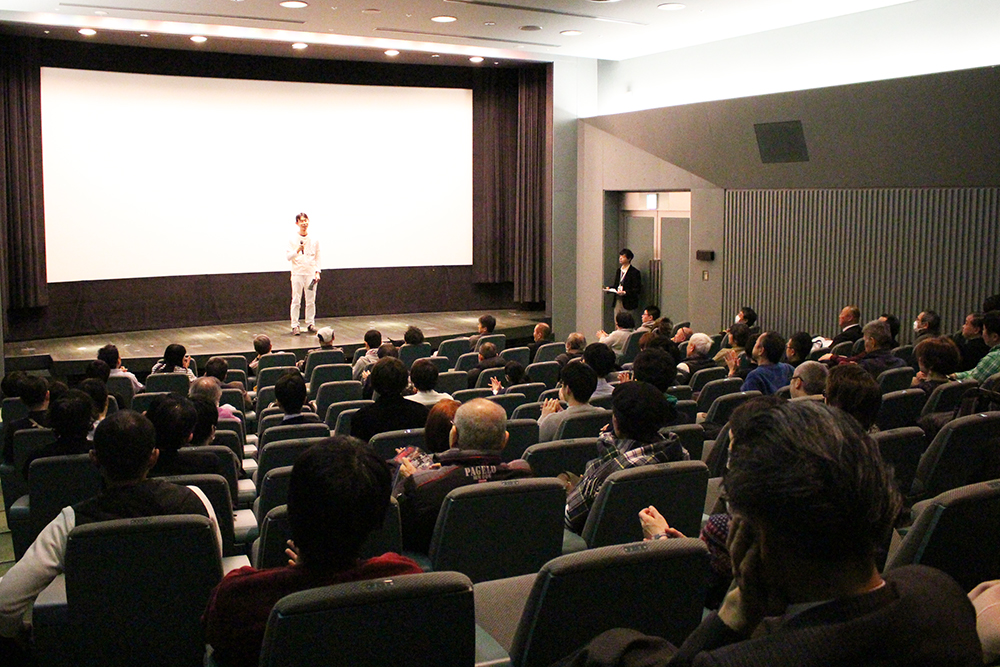
January 27, 2019
at B1 Theatre, National Film Archive of Japan
Greetings. My name is Otsuka from the Fukuoka Independent Film Festival. I’m grateful that so many people turned out today. The Fukuoka Independent Film Festival celebrated its 10th edition last year. When it began in 2009 as a place for independent filmmakers in Fukuoka to screen their films, it was really a very small film festival. That small gathering started a competition in 2010, opened its gates to films from around the country, and envisioned growth through a healthy rivalry between Fukuoka films and films from beyond. There were only 36 or 37 entries at first, but last year we received almost 160 films – in fact 159 films, of which we showed 158, excluding one film which pulled out.
Fukuoka Independent Film Festival is unique because of its policy to screen all submissions. Most film festivals are limited by time or staff shortage to show just a selection of the entries. But the spirit of the Fukuoka Independent Film Festival is to create the event in collaboration with the filmmakers. The festival hardly gets any funding from grants or corporate sponsorships – most of the budget relies on entry fees from film submissions. Our accounts are almost never in the red. In essence, instead of being run by an organizing committee, the festival is created through a form of cooperation with the filmmakers. Compared to the other five festivals introduced in this event today, our history may be short and our achievements few. Nevertheless, we are determined to keep on with our activities as a unique and original film festival in the Kyushu region.
Our call is open to fiction, documentary, animation, experimental, and contemporary art films. Our awards are also particular in that they are not simply one Grand Prix or Best Prize, but are divided into sections according to length. We award one Grand Prix for the most outstanding film, while we give best prizes to categories of 5 minutes, 20 minutes, 40 minutes, 60 minutes, and 100 minutes (feature length). We are strapped for cash and so we don’t have cash prizes, but in 2018 we offered the winner the chance of a theatrical run in CinemaROSA in Ikebukuro, Tokyo. “CenterLine” – the film you’re seeing today will be released at CinemaROSA from April 20 on. Some short films from our program were also selected for screening at CinemaROSA, thanks to the cinema staff who discovered them when attending our festival.
Due to Fukuoka’s geographic proximity to neighboring Asian countries, we have an active exchange with Taiwan and South Korea. We recommend films to each other and run each other’s films. Through cooperation with the Institut Francais in Fukuoka, we’ve also had the opportunity to introduce French cinema at our film festival. We hope that our films will get a chance to show in France, too.
Independent films are often about the filmmaker’s daily surroundings or act as an homage to the past. But today’s film “CenterLine” deals realistically about the near future, ten years from now. As Chunichi Dragons baseball manager Hiromitsu Ochiai once asked: “Why do Japanese films never depict the future?” “CenterLine” takes on this challenge and deals with the future in a solid manner, offering an exciting film experience using a mixture of conventional and new methods. I hope you enjoy the next 67 minutes. Thank you.
【Fukuoka Independent Film Festival|Official Website】https://www.fidff.com/ (in Japanese)
・Why Screen All Submissions?
From the start of the festival, we were influenced by the “Film Independants” movement, as you can see in our name. Our stance lies in the decision to show all films that are proposed to us. The original “Film Independants“ had “no jury”, but we chose to announce prizes and nominations as a way to encourage the entrants.
Originally a festival for the locals, it has grown to nationwide fame. The number of film entries – 30-plus when we first started the competition – is now up to 160. Every year we are concerned about how to continue under the current method.
・Message or Advice to Filmmakers Today and Tomorrow
Whether in sports or arts, people who overestimate or rely on their talent or gift will soon find themselves against a wall. But those who are dedicated and passionate and those who manage to maintain a broad viewpoint will eventually grow stronger, even if they may struggle at the start. Results will show up in any kind of work these people tackle, be it filmmaking or beyond. I have noticed among participants in the film festival that those who watch other’s films and listen carefully seem to grow and gain the support of others, compared to those who just have a good time hanging out with friends.
If you sense that the Japanese film scene does not offer opportunity or income, why not work at studying English, Chinese, or Arabic and launch out to Asian and African countries? From a global perspective, film is a growing industry. The Japanese situation won’t change without something drastic happening, like a wave of young talent moving overseas.
The character of Fukuoka Independent Film Festival is represented by our refusal to discard films just because they’re “technically poor,” “not fun” or “not my taste.” You could also say this is a ruthless approach, because showing all entries means bad films are ostensibly made public alongside good films.
It’s a very exciting experience to take part in this event in the lively city of Fukuoka, to watch so many films, speak directly with other filmmakers and to learn from them. Incidentally, there are lots of cheap and great eateries around the festival venue. “Thanks to my trip to Fukuoka, I gained energy and inspiration,” “I want to go back to watch movies, discuss, and eat ramen again.” –We were so glad to get such comments from participants who had traveled from afar to attend our event.
Fukuoka Independent Film Festival is an “Independent League” for cinema (as in baseball), which serves not only well-trained filmmakers or a select group of filmmakers, but everyone – including those who would grovel in the dirt to achieve their goals, and those who just want to enjoy filmmaking at their leisure regardless of age or career. Please do challenge yourself and sign up to participate. I look forward to hearing from you.
Translator: Asako Fujioka

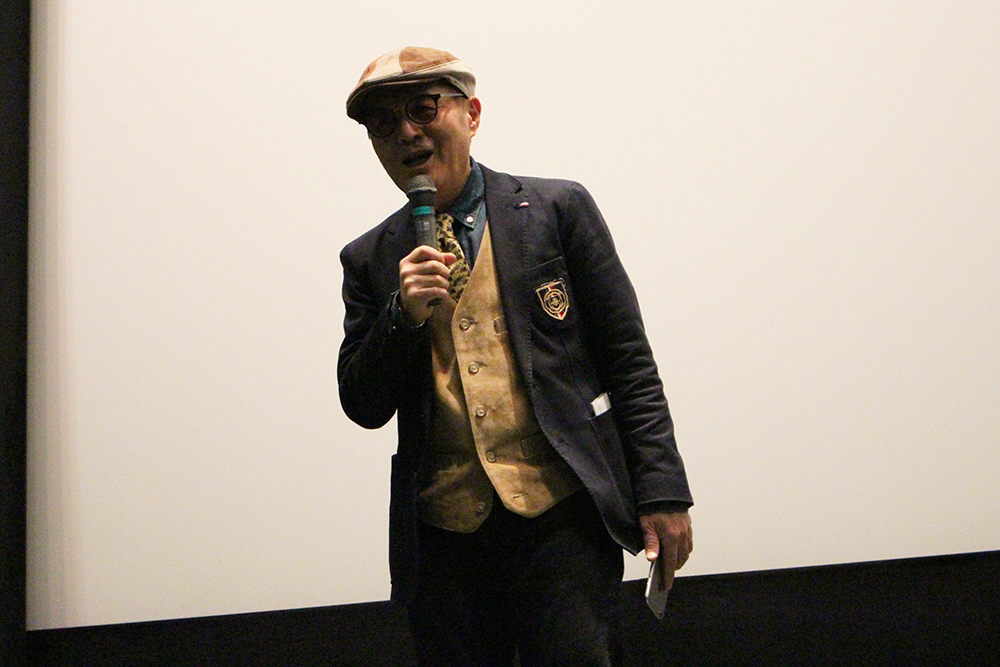
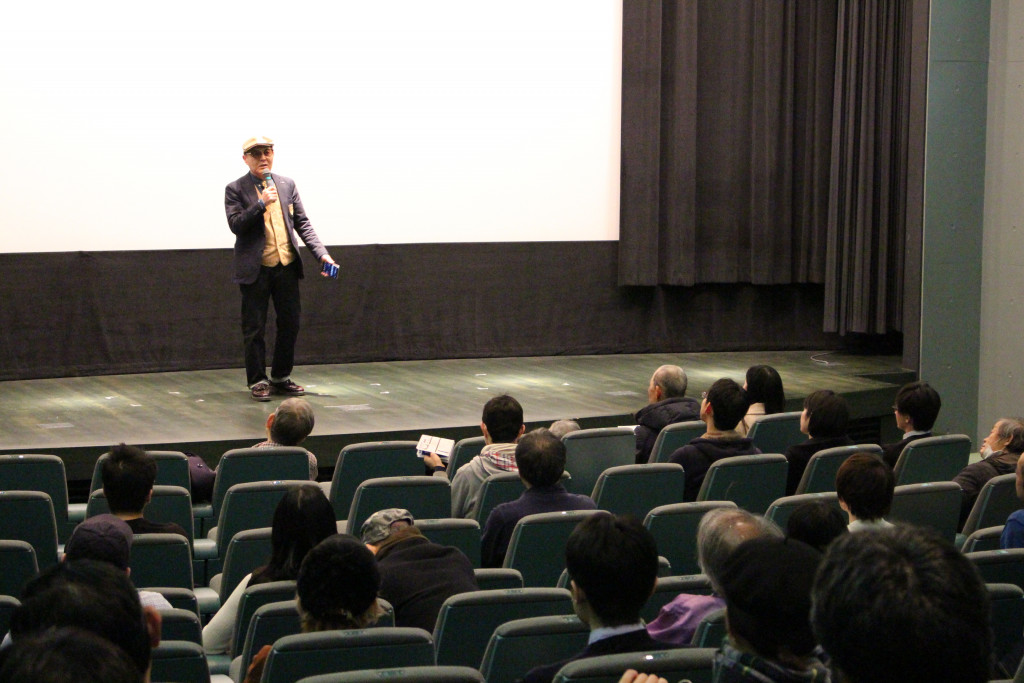
January 27, 2019
at B1 Theatre, National Film Archive of Japan
My name is Kakeo. I’d like to start by telling you how this film festival began. It’s actually quite a feat to organize a film festival outside the major cities of Japan. It’s awkward to say this in front of the city officials attending here, but Tanabe is the least known locality among all the festivals invited to the “Rising Filmmakers Project” – Pia Film Festival (PFF), Skip City, Fukuoka, Kanazawa, and Yubari. It’s really tough running a film festival in such a city.
The Japanese government hosts an umbrella project called Japan International Contents Festival, which includes events such as the Tokyo International Film Festival. There used to be a similar scheme for western Japan called Creative Industry Showcase in Kansai. When the Kansai Bureau of Economy, Trade and Industry announced funding for this in 2006, a city councilman from Tanabe City suddenly came to see me and declared, “We want to do a film festival.” I was still working at Kinema Junpo at the time, and initially told him, “There’s no way a film festival would work out. You should give up the idea.” But since he was so determined, I worried that he would be taken advantage of if he went elsewhere for help. So I said, “I give in, let’s try it out,” and we launched the project.
His idea was to focus on the Eiga kentei shiken (Film Certification Exam), and to invite the people who had passed the exam to take part in the film festival as special jury members. This drew very good results. Even though the number of filmmakers on stage was often more than the audience during the first three editions, attendance gradually grew. Film Certification awardees are like Christian believers under persecution – they don’t have anyone to share their devotion to cinema in their daily lives and thus are considered oddballs. These people started coming to our festival, so excited to be able to talk about film until 4 or 5 in the morning. These “repeaters” grew in number and the festival gained momentum.
The other lucky factor is that Satoshi Sawamura from Tokyo Theatres was running the festival alongside me, allowing the prize-winning films to be shown at Theatre Shinjuku (in Tokyo) and Cine Libre Umeda (in Osaka) in late show slots, the following May or June. Being able to present the films in ticketed commercial cinemas with devoted film audiences really boosted the film festival. Thanks to the culmination of such incentives, the festival became a very vibrant one, drawing people to want to attend again.
“Chonticha at end of the summer” is directed by Mei Fukuda, a graduate of TOHO GAKUEN Institute, a vocational school for filmmaking. Ever since the filmmaker Toshiyuki Mizutani joined its faculty, his campaign to “Aim for PFF” immediately resulted in an emergence of film directors and staff coming from this school – Aya Igarashi’s “A Crimson Star” (2018) was released at Theatre Shinjuku and Tatsuya Ishii’s “What A Wonderful World” (2018) was invited to PFF and this year’s Tanabe-Benkei Film Festival. “Chonticha at end of the summer” follows in their footsteps, and is unique in its focus on racial diversity, a rare topic among young Japanese filmmakers. I regard it highly for investigating what is close to us and revealing something that is overlooked.
Though we wish to develop a unique identity as a film festival, submissions to us almost entirely overlap with the 600 to 700 entrants to the Pia Film Festival. It’s not easy to find our own voice. Nevertheless, with our collaboration with Theatre Shinjuku, we continue with a determination to program independent filmmakers whose future work will be commercially viable.
In any case, I do hope you enjoy this film. Thank you for your attention.
【Tanabe-Benkei Film Festival|Official Website】http://www.tbff.jp/ (in Japanese)
・Intentions Behind the Theatrical Exposure of Award-winning Titles
Our film festival has always aimed to be a place to discover emerging filmmakers with ambitions for commercial filmmaking. Through discussion with Tokyo Theatre’s Satoshi Sawamura who was part of the team from the start, we decided to motivate entrants by providing winners with the chance to screen at Theatre Shinjuku in a late show slot. We also pushed the awardees to compete in ticket sales so that they would take the business element seriously and not take the opportunity for granted.
As a gesture of support for the winners, we also organize events several times a year, inviting producers from the indie film scene to meet awardees from our past film festival editions.
・Message or Advice to Filmmakers Today and Tomorrow
Pursue what is unique to you. What isn’t suited to you will never work out. Find a producer with whom you have a mutual understanding.
Translator: Asako Fujioka


